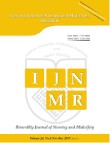Iranian Azeri women's perceptions of unintended pregnancy: A qualitative study
Author(s):
Abstract:
Background
Many women, throughout their life cycle, experience unintended pregnancy and its subsequent induced abortion. Nonetheless, women’s perceptions of this phenomenon – particularly in countries prohibiting elective abortion – are poorly known. The aim of this study was to explore Iranian Azeri women’s perceptions of unintended pregnancy.Materials And Methods
This was a conventional content analysis study conducted in Tabriz, Iran. The data were collected through 31 semi-structured interviews with 23 women who had recently experienced an unintended pregnancy. The study participants were recruited using the purposive sampling method. Sampling started in March 2013 and continued until reaching data saturation, i.e. till August 2013. Data analysis was carried out concurrently with data collection. MAXQDA 10.0 software was employed for managing the study data.Results
The study data analysis process yielded the formation of three main themes including negative effects of unintended pregnancy on daily life, fear of being stigmatized with violating social norms, and abortion panic, which in turn constituted the broader overarching theme of “threat supposition.” In other words, following an unintended pregnancy, the study participants had experienced different levels of fear and threat depending on their personal, family, and socio-cultural backgrounds.Conclusions
Women perceive unintended pregnancy as a challenging and threatening situation. An unintended pregnancy can threaten women’s lives through social deprivations, growing instability, and putting both mother and baby at risk for physical and psychosocial problems. On the other hand, an unsafe illegal abortion could have potentially life-threatening complications. To cope with such a situation, women need strong social support. Healthcare providers can fulfill such women’s need for support by developing pre-abortion counseling services and providing them with professional counseling. Also, strengthening women’s support system by policy-makers is recommended.Keywords:
Language:
English
Published:
Iranian Journal Of Nursing and Midwifery Research, Volume:20 Issue: 2, Mar-Apr 2015
Pages:
255 to 262
magiran.com/p1400148
دانلود و مطالعه متن این مقاله با یکی از روشهای زیر امکان پذیر است:
اشتراک شخصی
با عضویت و پرداخت آنلاین حق اشتراک یکساله به مبلغ 1,390,000ريال میتوانید 70 عنوان مطلب دانلود کنید!
اشتراک سازمانی
به کتابخانه دانشگاه یا محل کار خود پیشنهاد کنید تا اشتراک سازمانی این پایگاه را برای دسترسی نامحدود همه کاربران به متن مطالب تهیه نمایند!
توجه!
- حق عضویت دریافتی صرف حمایت از نشریات عضو و نگهداری، تکمیل و توسعه مگیران میشود.
- پرداخت حق اشتراک و دانلود مقالات اجازه بازنشر آن در سایر رسانههای چاپی و دیجیتال را به کاربر نمیدهد.
دسترسی سراسری کاربران دانشگاه پیام نور!
اعضای هیئت علمی و دانشجویان دانشگاه پیام نور در سراسر کشور، در صورت ثبت نام با ایمیل دانشگاهی، تا پایان فروردین ماه 1403 به مقالات سایت دسترسی خواهند داشت!
In order to view content subscription is required
Personal subscription
Subscribe magiran.com for 70 € euros via PayPal and download 70 articles during a year.
Organization subscription
Please contact us to subscribe your university or library for unlimited access!



